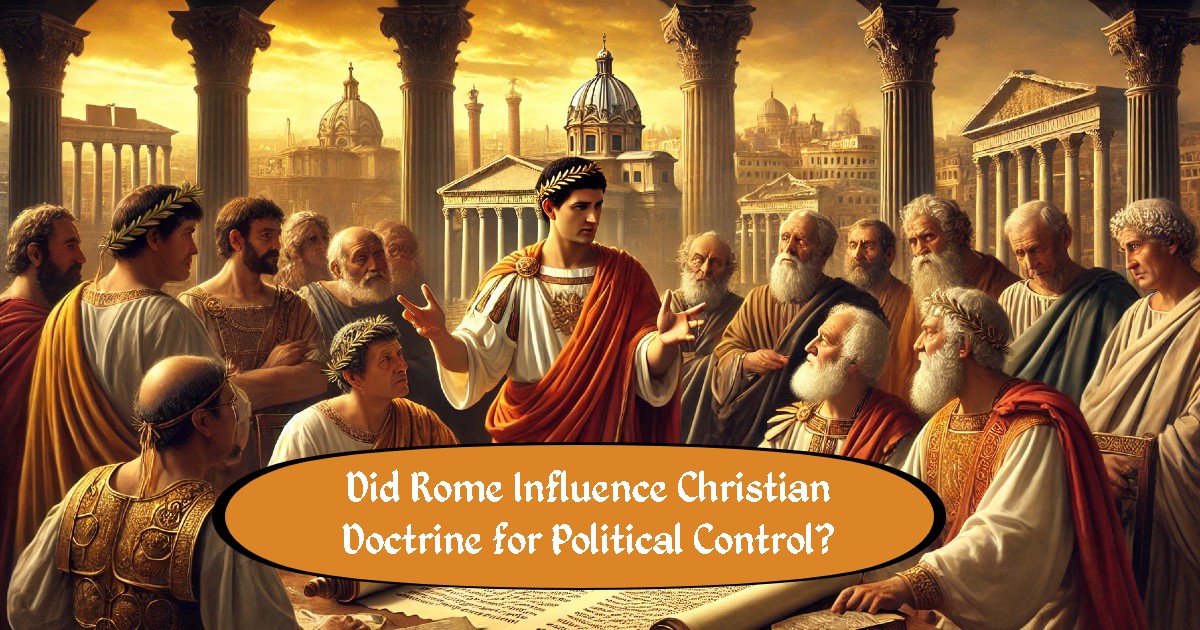A Conspiracy of Faith? How Rome Shaped Christianity to Serve Its Empire
When the Roman legions stormed Jerusalem in 70 CE, burning the Second Temple to the ground, they weren’t just destroying a building. They were crushing a religious and cultural identity, dismantling the Jewish priestly class, and shifting the balance of religious power forever. But was this just military conquest—or the beginning of a calculated effort to reshape a growing faith?
By the time Christianity emerged as a major force in the Roman Empire, its doctrine had evolved in ways that curiously aligned with imperial interests. Was this divine revelation—or Roman manipulation?
Let’s dig into the ancient sources and the writings of renowned scholars to expose the shocking connections between Christian theology and Roman political strategy.
The Roman Destruction of the Temple: A Catalyst for Change
The destruction of the Second Temple in 70 CE by Titus, son of Emperor Vespasian, wasn’t just a military victory; it eradicated the central institution of Jewish religious life. The loss of the Temple meant:
- The Jewish priesthood was effectively wiped out.
- Temple sacrifices—central to Jewish worship—ceased.
- Jewish identity had to be rebuilt around scripture and community, rather than the Temple.
This left a power vacuum in religious authority—one that would soon be filled by the emerging Christian movement, a movement that, unlike Judaism, was increasingly embracing Roman rule rather than resisting it.
Paul of Tarsus: A Roman Citizen’s Theology?
Paul (formerly Saul) of Tarsus, the most influential figure in early Christian doctrine, was a Roman citizen (Acts 22:25-28). His writings shape much of Christian theology—but they also contain notable pro-Roman sentiments:
- Obedience to Rome:
- “Let everyone be subject to the governing authorities, for there is no authority except that which God has established.” (Romans 13:1-2)
- Here, Paul explicitly tells Christians to accept Roman rule as God-ordained—a stark contrast to Jewish Zealots who fought against Rome.
- Shifting Focus Away from Jewish Law:
- “For we maintain that a person is justified by faith apart from the works of the law.” (Romans 3:28)
- By emphasizing faith over Jewish law, Paul distanced Christianity from the resistance-oriented Jewish identity, making it more palatable to Roman authorities.
- Jesus as a Peaceful King, Not a Revolutionary Messiah:
- Unlike the Jewish expectation of a warrior Messiah, Paul preaches a Messiah who submits to execution by Rome—a stark contrast to figures like the Maccabees, who fought for Jewish sovereignty.
Constantine’s Takeover: The Ultimate Romanization of Christianity
By the 4th century, Emperor Constantine saw the growing Christian movement as a tool for unifying the Empire. His influence led to doctrinal shifts that further aligned Christianity with Roman control:
- Council of Nicaea (325 CE):
- Constantine convened this council to settle theological disputes, particularly the nature of Christ. The result? The Nicene Creed, which established Jesus as fully divine, aligning Christian belief with imperial ideology.
- This made Christianity monolithic and controllable, suppressing factions that might oppose imperial rule.
- Christianity Becomes the State Religion (380 CE):
- Theodosius I declared Nicene Christianity as the official religion of the Empire, outlawing competing sects.
- Pagan traditions were absorbed into Christianity—Sunday worship, December 25 as Jesus’ birthdate (Sol Invictus), and saint veneration—making it more appealing to Rome’s population.
Biblical Academics Weigh In: Evidence of Rome’s Hand in Doctrine
Prominent scholars have long noted Rome’s fingerprints on Christian theology:
- Bart Ehrman (Misquoting Jesus, How Jesus Became God):
- Argues that early Christian texts were altered over time to fit theological (and often political) agendas.
- Elaine Pagels (The Gnostic Gospels):
- Shows how the Roman Church suppressed alternative Christian texts that might challenge its authority.
- Richard Carrier (On the Historicity of Jesus):
- Suggests that the Roman elite helped shape Christian doctrine to turn a Jewish revolutionary movement into a pacifist faith that wouldn’t resist Roman rule.
Conclusion: A Religion Forged in the Fires of Empire?
The evidence is clear: Rome didn’t just adopt Christianity—it reshaped it. From Paul’s writings to Constantine’s councils, the faith that began as a Jewish sect became a Romanized doctrine that aligned with imperial power.
Did Rome manipulate Christian doctrine to serve its own interests? The ancient texts suggest yes. Whether intentional or not, the Roman Empire transformed Christianity from a revolutionary Jewish movement into the dominant faith of the Western world.
Sources:
- Bart Ehrman – Misquoting Jesus, How Jesus Became God
- Elaine Pagels – The Gnostic Gospels
- Richard Carrier – On the Historicity of Jesus
- Josephus, Flavius – The Jewish War (first-century Roman-Jewish historian)
- Eusebius of Caesarea – Ecclesiastical History (4th-century church historian)

